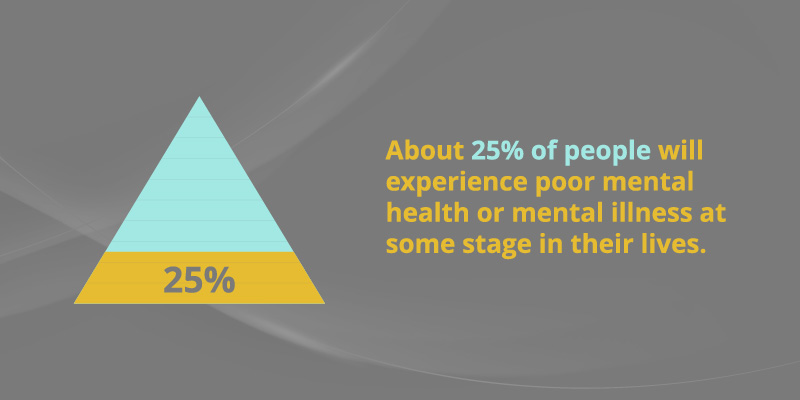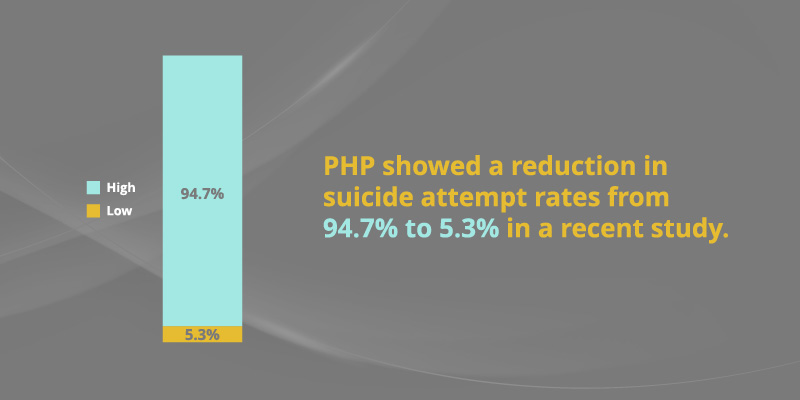Partial Hospitalization Programs Demystified: Your Path to Recovery
Learn more about the benefits of a partial hospitalization program and how Black Horse Health can help.
How Our Partial Hospitalization Program at Black Horse Health Works to Support You
At Black Horse Health, we understand just how debilitating unsupported symptoms of mental health or substance use disorder challenges can feel. They can leave individuals feeling hopeless and lacking autonomy over their life and well-being. Know that you or your loved one don’t have to struggle alone.
Our team of skilled and compassionate specialists have over 100 years of combined experience, and we are committed to helping you or your loved one get the treatment you need through our partial hospitalization program.
By providing more intensive treatment than an outpatient program while still allowing patients to return home each day, we can help you address your needs while ensuring you remain supported and cared for.
Read On and Reach Out for Support
Learn more about our partial hospitalization program, other treatment opportunities, and how our Black Horse Health team of specialists can help you heal in this comprehensive article. Don’t hesitate to reach out to our team for more information or to begin your path to wellness today.

What is a Partial Hospitalization Program?
Mental illness affects more than 1 in 5 Americans, highlighting the need for accessible and effective mental health treatment.1
A partial hospitalization program (PHP) is a mental health treatment program that provides intensive care and support for people struggling with mental illness, substance use disorder (SUD), or dual diagnosis.
What Happens in a Partial Hospitalization Program?
- Structured therapy sessions
- Medication management
- Various therapeutic interventions
How Does a Partial Hospitalization Program Fit Within the Spectrum of Mental Health and Substance Use Disorder Care?
A partial hospitalization program offers a structured and intensive level of care. It bridges the gap between inpatient hospitalization and outpatient treatment. Below are a few insights into the partial hospitalization program’s significance and role in health care.
Assessing Individual Needs
- Psychiatrists
- Psychologists
- Addiction specialists
Intensive Treatment and Support
- Therapy sessions
- Group counseling
- Yoga
- Medication management
- Other evidence-based interventions
Transitioning from Inpatient Care
Comprehensive Care for Dual Diagnosis
People with mental health conditions often struggle with drugs or alcohol. Partial hospitalization programs address dual diagnosis.
Flexibility and Individualized Care
Continuity of Care
- Treatment can continue
- The plan can change if needed
- Support is always available

Disorders and Conditions Treated in a Partial Hospitalization Program
Depression
21 million U.S. adults faced at least one major depressive episode in 2021.3
Depression is a mental health disorder characterized by persistent feelings of sadness, hopelessness, and a lack of interest or pleasure in daily activities. A PHP provides structured therapy and medication help for people with depression to feel better.
Anxiety Disorders
Anxiety disorders cause people to worry excessively or experience intense fear. Partial hospitalization programs help by teaching skills to cope with these feelings. They also offer therapy to talk about and manage these worries.
Substance Use Disorders
- Individual counseling
- Group therapy
- Education on relapse prevention
- Meditation
- Art therapy
Dealing with Trauma
- An accident
- Abuse
- A natural disaster
Therapy and support groups during a partial hospitalization program can help people heal and find ways to cope with their trauma.
Navigating Suicidal Thoughts
- Individual counseling
- Crisis management techniques
- Group therapy
Comparing a Partial Hospitalization Program to Inpatient Treatment and Traditional Outpatient Therapy
Structure and Support in a Partial Hospitalization Program
- Therapy sessions
- Group activities
- Various evidence-based treatments
Flexibility of Living at Home
Intensity of Treatment
Comprehensive Care Services
- Individual therapy
- Group therapy
- Family therapy
- Psychiatric evaluations
- Medication management
- Holistic approaches such as yoga or meditation
Transitioning Towards Independent Living
Cost-Effectiveness

Typical Structure and Daily Schedule of a Partial Hospitalization Program
Morning Session
- Personal hygiene routines
- Dressing exercises
- Basic mobility exercises
Group Therapy Sessions
- Discuss their challenges
- Share insights
- Learn from one another
Group therapy sessions usually last for about 60 minutes and cover topics such as coping skills, relapse prevention, and emotional regulation.
Individual Therapy Sessions
- Cognitive-behavioral therapy (CBT)
- SMART Recovery
- Dialectical behavioral therapy (DBT)
Skill-Building Activities
- Art therapy
- Drama therapy
- Recreational activities
Meal Times
Medication Management
Afternoon Reflection and Review
Duration and Intensity
Are There Specific Criteria Used to Determine if Someone Should Attend a PHP?
- Strengths
- Challenges
- Specific therapy needs
Therapeutic Approaches and Modalities Used in a Partial Hospitalization Program
Dialectical Behavior Therapy (DBT)
- Manage emotions
- Improve relationships
- Cope with distressing situations
Skills Training
- Mindfulness
- Distress tolerance
- Emotion regulation
- Interpersonal effectiveness
Cognitive-Behavioral Therapy (CBT)
Art Therapy
- Improve their self-esteem
- Gain self-awareness
- Develop better coping skills
Yoga and Mindfulness
Who Is an Ideal Candidate for Participation in a Partial Hospitalization Program?
How Does Family Involvement and Support Factor Into the PHP Treatment Process?
Creating a Supportive Environment
Enhanced Communication
Education and Understanding
Collaborative Treatment Planning
Skill-Building and Reinforcement
Long-Term Support and Relapse Prevention

The Role of Medication Management in a Partial Hospitalization Program
The Assessment of Medication Needs
- How serious the issues are
- How past treatments worked
- Other medicines patients take
Collaboration Between Medical and Mental Health Professionals
Tailoring Medications to Individual Needs
- Symptoms
- How much medicine is needed
- Frequency of dosage
- Time of dosage
Monitoring Treatment Progress
- Regular check-ins
- Tests
- Patient feedback
Adjusting and Modifying Medication Plans
Educating Patients and Providing Support
Collaborative Decision-Making
Transitioning From a Partial Hospitalization Program to Less Intensive Levels of Care
Evaluation and Assessment
Creating an Individualized Plan
Based on the evaluation, the treatment team will create an individualized plan for ongoing care. This plan outlines treatment goals and the frequency of sessions.
In addition, it describes specific interventions tailored to each patient’s needs. As a result, it serves as a roadmap for long-term recovery.
Gradual Reduction of Treatment Sessions
Ongoing Individual Therapy
Group Therapy and Support
Building Coping Skills
Throughout the transition, patients focus on building and refining coping skills. These skills help manage stress, triggers, and cravings effectively.
- Mindfulness
- Relaxation exercises
- Problem-solving techniques
Relapse Prevention Planning
Preventing relapse is a priority. The treatment team will work closely with each person to develop a relapse prevention plan.
- Identifies potential triggers and high-risk situations
- Provides strategies to avoid or cope with them
- Establishes a support network for emergencies or moments of vulnerability
Aftercare Support and Follow-Up

Black Horse Health’s Partial Hospitalization Program
Individualized Treatment Plans
At Black Horse Health, we understand that every person’s journey is unique. That’s why we start by creating individualized treatment plans.
Our team of experts conduct a thorough assessment, considering your specific needs, goals, and challenges. This plan serves as your roadmap throughout the PHP program.
Multidisciplinary Team
- Psychiatrists
- Psychologists
- Therapists
- Medical professionals
Structured Environment
Transition Planning
Medication Management
Ongoing Counseling and Therapy
- Explore challenges
- Set new goals
- Develop coping skills
Coping Skills Development
Developing coping skills is essential for long-term well-being. Our program focuses on teaching you practical strategies to manage stress, triggers, and cravings. From mindfulness to problem-solving, these skills empower you to navigate challenges effectively.
Aftercare Support
Contact Black Horse Health Today
Now is the time to take the first step toward healing. Reach out to us to kickstart your recovery journey today.
Resources
- https://www.nimh.nih.gov/health/statistics/mental-illness
- https://www.samhsa.gov/newsroom/press-announcements/20230104/samhsa-announces-nsduh-results-detailing-mental-illness-substance-use-levels-2021
- https://www.nimh.nih.gov/health/statistics/major-depression
- https://www.cdc.gov/media/releases/2023/s0810-US-Suicide-Deaths-2022.html
- https://www.ncbi.nlm.nih.gov/pmc/articles/PMC8380649/
- https://substanceabusepolicy.biomedcentral.com/articles/10.1186/s13011-021-00347-0


